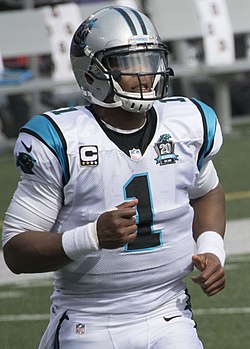| Carolina Panthers | |||||||||||||
|---|---|---|---|---|---|---|---|---|---|---|---|---|---|
| |||||||||||||
| General information | |||||||||||||
| Founded | October 26, 1993 [1] [2] | ||||||||||||
| Inaugural season | 1995 | ||||||||||||
| Stadium | Bank of America Stadium (Charlotte, North Carolina) | ||||||||||||
| Headquartered | Charlotte, North Carolina, U.S. | ||||||||||||
| Colors | Black, process blue, silver [3] [4] [5] | ||||||||||||
| Mascot | Sir Purr | ||||||||||||
| Website | panthers | ||||||||||||
| Personnel | |||||||||||||
| Owner | David Tepper [6] [7] | ||||||||||||
| General manager | Dan Morgan | ||||||||||||
| Head coach | Dave Canales | ||||||||||||
| President | Kristi Coleman [8] [9] | ||||||||||||
| Team history | |||||||||||||
| |||||||||||||
| Home fields | |||||||||||||
| |||||||||||||
| League / conference affiliations | |||||||||||||
National Football League (1995 –present)
| |||||||||||||
| Championships | |||||||||||||
| Conference championships: 2 | |||||||||||||
| Division championships: 7 | |||||||||||||
| Playoff appearances (9) | |||||||||||||
| Owners | |||||||||||||
| |||||||||||||
The Carolina Panthers are a professional American football team based in Charlotte, North Carolina. The Panthers compete in the National Football League (NFL) as a member of the National Football Conference (NFC) South division. The team is headquartered in Bank of America Stadium in Uptown Charlotte, which also serves as the team's home field. The Panthers are supported throughout the Carolinas; although the team has played its home games in Charlotte since 1996, it played its home games at Memorial Stadium in Clemson, South Carolina, during its first season in 1995.
Contents
- History
- Beginnings
- Jerry Richardson era (1995–2017)
- David Tepper era (2018–present)
- Logo and uniforms
- Logo
- Uniforms
- Stadium and practice facilities
- Team headquarters
- Culture
- Mascot, cheerleaders, and drumline
- Keep Pounding Drum
- Songs and traditions
- Charity and community work
- Radio and television
- Rivalries
- Conference
- Current staff
- Players
- Current roster
- Hall of Honor
- Retired numbers
- Pro Football Hall of Fame enshrinees
- Ownership and administration
- Jerry Richardson
- Team president
- David Tepper
- Coaches
- Current staff 2
- Season-by-season results
- Team records
- See also
- References
- External links
The Panthers were announced as the league's 29th franchise in 1993 and began play in 1995 under founding owner Jerry Richardson. [10] The Panthers played well in their first two years, finishing 7–9 in 1995 (an all-time best record for an NFL expansion team's first season) and 12–4 the following year, winning the NFC West before ultimately losing to the eventual Super Bowl champion Green Bay Packers in the NFC Championship Game. They did not have another winning season until 2003 when they won the NFC Championship Game and reached Super Bowl XXXVIII, losing 32–29 to the New England Patriots. After recording playoff appearances in 2005 (3rd NFC Championship appearance) and 2008, the team failed to make another playoff appearance until 2013, the first of three consecutive NFC South titles. After losing in the divisional round to the San Francisco 49ers in 2013 and the Seattle Seahawks in 2014, the Panthers returned to the Super Bowl in 2015 but lost to the Denver Broncos. The team's seven NFC South titles since the division's establishment in 2002 tie with the Tampa Bay Buccaneers and New Orleans Saints.
The franchise is legally registered as Panther Football, LLC, [11] and is controlled by David Tepper, whose purchase of the team from founder Jerry Richardson was unanimously approved by league owners on May 22, 2018. The club, which Forbes valued at approximately US$2.3 billion in 2018, [12] is estimated at $4.1 billion in 2023. [13]
























